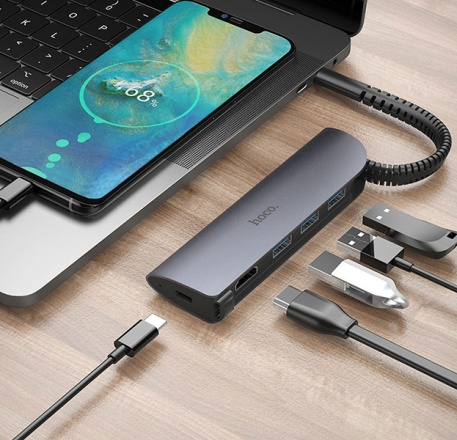Answer the question
In order to leave comments, you need to log in
How to make it easier to switch keyboard, mouse and monitors between laptop and desktop?
Given:
Laptop with 2x USB Type-C connectors (Thunderbolt) and HDMI connector
Stationary system unit
2 4K monitors (In perspective 3) with HDMI and DisplayPort
USB mouse
USB keyboard
It must be possible to switch monitors, mice and keyboards between devices without having to regularly reconnect cables. Ideally, only a USB cable would go to the laptop and only it would need to be disconnected / connected. By what means can this be done? Software solutions are not of interest due to the impossibility of installing extra software on a laptop. I read about KVM switches, but they mainly offer only VGA and only 1 monitor, while usb-c is not there (well, or I have not seen such solutions). I forgot to say, monitors should work in extended desktop mode, i.e. Each monitor has its own picture.
I also consider wireless solutions if they do not require a long setup with each connection.
Answer the question
In order to leave comments, you need to log in
Look for a Type-C hub, for example Hoco HB13 and reconnect only it.

1. The easiest way is to use a laptop hub. Type-C hubs need to be looked for carefully. Many of them are clueless.
We need a hub, ideally with TB, with support for 2 * 4K @ 60. The third - I don’t know if it will work, and if so, probably to the detriment of the frame rate.
Here a person is looking for a good dock for himself, I advise you to read (see comments on the question, the main thing is there):
How to connect two monitors to a laptop?
2. Hub - not quite a switch. Purely theoretically, if the PC also had a TB, it would be possible to switch all the peripherals by poking the hub between the laptop and the PC, practically a PC with TB is a rarity, and the graphics are not always driven into it, or driven in the right form.
Those. even if you connect monitors to both the hub and the PC at the same time, you will have to switch the input to them, which is a chore, and solve the issue with the peripherals. Keyboards / mice - there are models with switching between several hosts, for example, Logitech. With the keyboard there, press one key, with the mouse - you have to turn it over. In any case, it doesn't turn out very well - switching monitors, mouse, keyboard ...
If there was a TB in the PC, you would have to poke the hub cable. It's also not very convenient.
Before bogging down all this in hardware, it makes sense to evaluate such connections in terms of the throughput of the USB connection (you are going to use it, right?). And along the way, you can stumble upon unexpected pitfalls.
Let's start with the fact that the keyboard and mouse create a data stream in a matter of bytes, so you can forget about them altogether. The main load of the channel is two 4k monitors (three in the future).
I met bitrate estimates for a 4k video stream on the Web, which is about 25 ... 30 megabits / sec. Two monitors - 60, three - 90. It seems to be not so much, and it is very far from the theoretical limit of the USB-2.0 channel (480 Mbps). Nevertheless, I am absolutely sure that USB-2.0 will not pull not only three monitors, but even two, since the channel bandwidth there depends on the strangest accidents - for example, on the length and quality of the USB tail with which all this economy is connected to the computer .
But for USB-3.0 and USB-C, the picture is more acceptable, there is a sufficient margin in terms of bandwidth. You write that the laptop already has USB-C. So, it is necessary to provide a desktop computer with such a port. Then get a hub with a USB-C connection, equip it with two (or three) USB video cards, and your task seems to be solved. And do not forget that the cable leading to this hub should also not be too long (preferably not longer than 30 cm).
VGA KVM is a wild antiquity.
Something like this is needed, there are many different variations of aten, choose for yourself what will be more convenient.
https://www.aten.com/ru/ru/products/kvm/%D0%BD%D0%...
while usb-c is not there (well, or I have not seen such solutions)If you want with type-c, then it won't work. More precisely, there will be problems. Here's the thing: both USB3 and Thunderbolt hubs usually have usb hubs, network cards, etc. inside them. (and only the video signal is forwarded from the laptop's video card, although I would not be surprised if thunderbolt hubs exist with their own video card, the interface allows it). Thus, if it is also plugged into KVM, then at the moment of switching for a laptop, a lot of devices will fall off, as it were. And the KVM switch is designed in such a way that for computers it is itself a keyboard, mouse, etc., i.e. from the point of view of the computer, when switching outputs in KVM, nothing is disconnected from the computer.
Didn't find what you were looking for?
Ask your questionAsk a Question
731 491 924 answers to any question